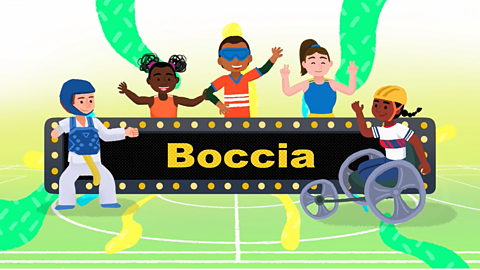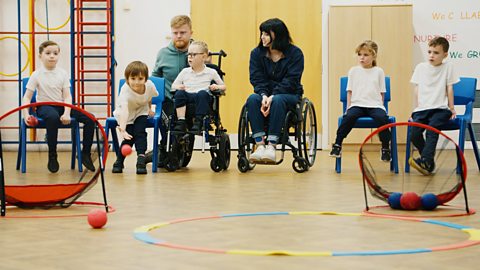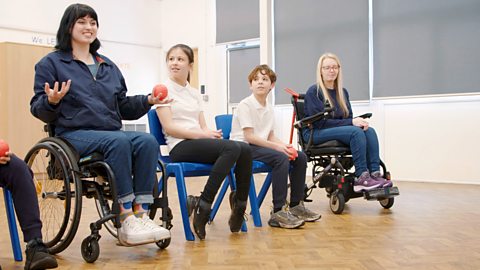Heading into his fifth Paralympic Games, David Smith is no stranger to the international stage. The Eastleigh-born athlete will be looking to retain his individual BC1 title for a third successive time in the French capital in 2024.
David Smith: I know there's a lot of people with my sort of disability who are smart, articulate, competitive… but without a competitive outlet. For me, it's like, why are they not playing boccia?
Kimberley Boak: So David, how did it all start for you with Boccia?
David Smith: I went to a school when I was 11 called Treloars. There was lots of activities going on and there was an opportunity to play boccia in the evenings. I wasn't particularly keen on the sport at the time, but it meant that I got out of doing homework. So I went to the club, played regularly and as I started playing regularly I got better at the sport, and one year I just got on a bit of a hot streak and I went to the British Championships, and I went there not expecting very much and I ended up winning it, so becoming the youngest ever British champion. So yeah, that was, kind of, how it all started.
Kimberley Boak: Since then, you've obviously had a glittering career. You've won individual gold in Rio and Tokyo. With that in mind, what are you thinking for Paris?
David Smith: For me, I really enjoyed the Paralympics in Tokyo and I'm hopeful that Paris, sort of takes that to another level again. The main thing for me is TV coverage. We had TV coverage in Tokyo and it totally transformed my experience of the Games, having the ability to showcase to a much wider audience. I think over a million people watched my match in the final in Tokyo, so again, we get those sort of numbers in Paris, not just for myself but for the other competitors as well, happy days.
Kimberley Boak: Why is it so important to have good people around you and have a good team around you?
David Smith: I mean, it's really important because a. it's the information you get back. And, obviously when you're in a competition, in that high pressure environment, your brain is your biggest enemy really. So I need people around me who know me, that I can bounce ideas off, that can challenge me in the right way and get the best out of me. When I'm feeling a bit uncertain or unsure, they can reassure me.
Kimberley Boak: To anyone who's never played boccia, what would you say to them and why should they give it a go?
David Smith: The great thing about boccia is it's quite… I wouldn't say low level, but it's low threat. So you don't have to be a particularly athletic person to be good at boccia. It's a lot more about hand-eye coordination, posture, control, and then you can build the power as you play this sport, and a lot of it is touch and feel as well, it's not just about raw power. For me, boccia's a great game for that, that competitiveness, being a better person, trying different things, problem solving, communication.
Kimberley Boak: David, you're in Swansea today where you've created a whole boccia community. Why is it so important to you to pay it forward and create a springboard for the next generation?
David Smith: Because I've been playing the sport for so long now, I'm coming to the part of my career where I'm thinking about what's next? It's important to get more people with my sort of disability and the opportunity to play the sport because there is no other sport that I could potentially do at the Paralympics. You know, I know there's a lot of people with my disability who are smart, articulate, competitive, etc. but without a competitive outlet. For me it's like, why are they not playing boccia?
I know the reason for that and I want to make a difference.
Born with cerebral palsy, four-time world champion David Smith was introduced to boccia during his primary years at school. The sport was a slow burner for him to pick up at first, but he stuck at it and went on to win the British Boccia Championships in 2004 aged 14.
Fast forward to a career spanning almost two decades, David has gone on to win a number of Paralympic medals and a host of World and European titles. David now sits as Britain's most decorated boccia player of all time.
David explains that boccia was the only sport he could have played at an elite level due to the nature of his disability and with that in mind, he is now focused on getting more wheelchair users into the sport: "I know there’s a lot of people with my sort of disability who are smart, articulate, competitive… but without a competitive outlet.
Why aren’t they playing boccia? I know the reason for that and I want to make a difference." - David Smith
The Paralympic champion is on a mission to boost the sport to a wider audience. With over one million people tuning in to see him claim his gold medal in Tokyo three years ago, he hopes more live broadcasting during the Games can help elevate the sport to call out to a new generation of British boccia players.



